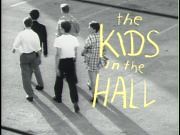 (Updated December 18, 2020)
(Updated December 18, 2020)Now this is more like it....
Even after the relative success of season one, this second season of Kids in the Hall looks and feels much more confident, more polished, more professional. You might be tempted to think that it was years between the two series...but it wasn't.
This is where the Kids begin to hit their stride. The first episode opens with a mordant m onologue from Scott which seems to say, "We're ba-a-a-ck!". Followed by a four-person skit which not only skirts the line of propriety, but puts its hand up that skirt, and we know...the Kids are coming into their down.
onologue from Scott which seems to say, "We're ba-a-a-ck!". Followed by a four-person skit which not only skirts the line of propriety, but puts its hand up that skirt, and we know...the Kids are coming into their down.
This was the season that introduced some of the Kids more popular characters, including Gavin, Derrill, and of course, Simon Milligan and Hecubus. But what makes the series truly come alive - what gives it a unique genius - are three key elements that very few sketch comedy shows (if any) share.
First is a willingness to take on sexual mores, stereotypes, and dynamics - it's smart that the Kids work in drag isn't over the top. It's not used as a comedy device in and of itself (like Milton Berle) - it's used to say things about men and women (both straight and gay) that men and women would be uncomfortable performing on stage.
Secondly is the idea of a "shared universe" of characters - much like comics, many characters begin appearing in multiple sketches, often times running into each other. It then becomes almost fodder for fanfiction (which I have engaged in myself...back in my younger days. Nothing like writing Gavin/Derrill mashups in your youth).

But ultimately, there begins a sense of extended narrative - of mashup and "comedic arcs" being used to develop characters, most notably cabbage head. We have some sense with Simon and Hecubus (although the promise will not be fulfilled until later seasons), but it's not in the beat-it-into-the-ground sense that smacks of Lorne Michaels. It's treating these characters as characters, and giving them a sense of scope, that makes them seem all the more fresh and interesting. They're not just punch line machines; they're people we care about.
Even without these innovations, season two would still be groundbreaking. The best is yet to come...but the current stuff? Still impressive.
Very highly recommended.
Even after the relative success of season one, this second season of Kids in the Hall looks and feels much more confident, more polished, more professional. You might be tempted to think that it was years between the two series...but it wasn't.
This is where the Kids begin to hit their stride. The first episode opens with a mordant m
 onologue from Scott which seems to say, "We're ba-a-a-ck!". Followed by a four-person skit which not only skirts the line of propriety, but puts its hand up that skirt, and we know...the Kids are coming into their down.
onologue from Scott which seems to say, "We're ba-a-a-ck!". Followed by a four-person skit which not only skirts the line of propriety, but puts its hand up that skirt, and we know...the Kids are coming into their down.This was the season that introduced some of the Kids more popular characters, including Gavin, Derrill, and of course, Simon Milligan and Hecubus. But what makes the series truly come alive - what gives it a unique genius - are three key elements that very few sketch comedy shows (if any) share.
First is a willingness to take on sexual mores, stereotypes, and dynamics - it's smart that the Kids work in drag isn't over the top. It's not used as a comedy device in and of itself (like Milton Berle) - it's used to say things about men and women (both straight and gay) that men and women would be uncomfortable performing on stage.
Secondly is the idea of a "shared universe" of characters - much like comics, many characters begin appearing in multiple sketches, often times running into each other. It then becomes almost fodder for fanfiction (which I have engaged in myself...back in my younger days. Nothing like writing Gavin/Derrill mashups in your youth).

But ultimately, there begins a sense of extended narrative - of mashup and "comedic arcs" being used to develop characters, most notably cabbage head. We have some sense with Simon and Hecubus (although the promise will not be fulfilled until later seasons), but it's not in the beat-it-into-the-ground sense that smacks of Lorne Michaels. It's treating these characters as characters, and giving them a sense of scope, that makes them seem all the more fresh and interesting. They're not just punch line machines; they're people we care about.
Even without these innovations, season two would still be groundbreaking. The best is yet to come...but the current stuff? Still impressive.
Very highly recommended.

No comments:
Post a Comment